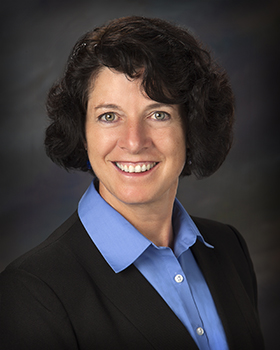In the Wisconsin Sea Grant online newsroom, we recently introduced four new members of the Advisory Council. Council members help shape Sea Grant’s future, enabling it to better serve the people of Wisconsin.
Now, here on our blog, we’d like to give people a chance to get to know those four newcomers better through Q & As. We begin with Deb DeLuca, executive director of the Duluth Seaway Port Authority.
Keep following the blog for upcoming installments with the other three new members: Madelyn Leopold, Becky Sapper and Lori Tate.

Deb DeLuca (submitted photo).
Do you have a favorite spot in the Great Lakes, or favorite natural area?
As a Lake Superior community resident, I spend a lot of free time (as well as work time) within view of, or on the shores of, Lake Superior. I love disappearing along Lake Superior’s North Shore, including those areas around Minnesota state parks, most often Tettegouche, Temperance River and Cascade River.
Along the South Shore, Pictured Rocks National Seashore and Porcupine State Park (in Michigan) are amazing, as are the Bayfield Peninsula and the Apostle Islands.
I adore any bike route, or hiking or Nordic ski trail, that includes Lake Superior views–especially when you turn a corner or descend a hill and the lake is suddenly spread out before you in all its glory–regardless of weather or season.
What drew you to say “yes” to serving on the Advisory Council?
My “yes” answer was driven by two trains of thought. First, I am not only a Wisconsin native, I am also a proud University of Wisconsin graduate. I earned my master’s degree through the land resources program at (what is now) the Nelson Institute for Environmental Studies. My research focused on the occurrence of pesticide degradation products in groundwater contaminated by the parent product, and the implications for health-risk-based standards for those pesticides.
My home department was the water chemistry department, whose building was located near the Memorial Union overlooking Lake Mendota. I was very aware of the Sea Grant program while I was in graduate school. One of our fantastic water chemistry professors, and a huge personality, Anders Andren, was Sea Grant director at the time.
Fast-forward many years: my son recently graduated from UW-Madison, and my father is still a UW emeritus professor. Serving on the Advisory Council keeps me close to my Wisconsin and UW roots and lets me return service to the University of Wisconsin System.
Secondly, I appreciate Wisconsin Sea Grant’s mission to promote “the sustainable use of Great Lakes resources” and its vision, which is “thriving coastal ecosystems and communities.” Thriving communities must thrive on ecosystem, societal and economic bases, and realistic solutions must balance the intersection of these three realms.
Great Lakes shipping plays an important role in the state and regional economy, yet it is relatively invisible, especially to non-waterfront communities. I am proud to represent the interests of shipping and waterborne commerce on the Advisory Council.
Is there a special aspect of Sea Grant’s work or mission that speaks to you the most?
There are many aspects that appeal to me. Working waterfronts and resilient coastal communities are key to all of us who live in towns and cities on the Great Lakes and love Great Lakes resources.
Resiliency will only become increasingly important with climate change. The aquatic invasive species focus is also important in my line of work: as responsible stewards of the Great Lakes, we must be aware and realistic about associated risks and set policy that is effective and practical.
Where would you like to see Sea Grant headed in the near future?
As an incoming member of the Advisory Committee, I think it is important to first engage and listen before articulating or identifying a direction for the organization.


